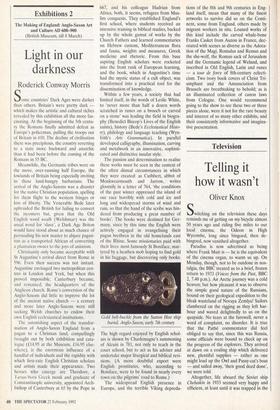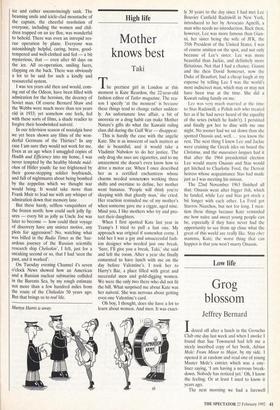Television
Telling it how it wasn't
Oliver Knox
witching on the television these days reminds me of getting on my bicycle almost 50 years ago and riding five miles to our local cinema, the Odeon in High Wycombe, long since bingoed, then de- bingoed, now vanished altogether.
Paradise is now advertised as being where Frank Muir is — he is the equivalent of the cinema organ, to warm us up. On Monday, though, not to be outdone in nos- talgia, the BBC treated us to a brief, frozen return to 1933 (Voices from the Past, BBC 2, 7.40 p.m.). An Arctic journey was a cold heaven; but how pleasant it was to observe the simple good nature of the Russians, bound on their geological expedition to the bleak wasteland of Novaya Zemlya! Sailors clambered on the rigging as they left har- bour and waved delightedly to us on the quayside. No tears at the farewell, never a word of complaint, no disorder. It is true that the Pathe commentator did feel obliged to say that, since this was Russia, some officials were bound to check up on the progress of the explorers. They arrived at dawn on a coaling ship which delivered new, plentiful supplies — rather as one might load up the Owl and Pussy-cat's boat — and sailed away, 'their good deed done', we were told.
Altogether, life aboard the Soviet ship Cheluskin in 1933 seemed very happy and efficient, at least until it was trapped in the ice and rather unconvincingly sank. The beaming smile and icicle-clad moustache of the captain, the cheerful resolution of everyone, including the women and chil- dren trapped on an ice floe, was wonderful to behold. There was even an intrepid res- cue operation by plane. Everyone was astonishingly helpful, caring, brave, good- tempered and well-clothed and fed — a bit mysterious, that — even after 60 days on the ice. All co-operation, smiling faces, clapping on the back. There was obviously a lot to be said for such a kindly and resourceful system.
I was ten years old then and would, com- ing out of the Odeon, have been filled with admiration for the heroism, the decency of Soviet man. Of course Bernard Shaw and the Webbs were much more than ten years old in 1933; yet somehow one feels, fed with these sorts of films, a shade readier to forgive their hoodwinked naïveté.
In our television season of nostalgia have we yet been shown any films of the won- derful Germans of the Thirties? In any case I am sure they would not work for me. Even at an age when I smuggled copies of Health and Efficiency into my home, I was never tempted by the healthy blonde mad- chen of Hitler youth: far too frightened by their goose-stepping soldier boyfriends, and full of nightmares about being bombed by the zeppelins which we thought war would bring. It would take more than Frank Muir to lead me with any whisper of admiration down that memory lane.
But these hardy, selfless vanquishers of the frozen north: how could such jolly fig- ures — every bit as jolly as Uncle Joe was later to become — how could their voyage of discovery have any sinister motive, any plots for aggression? No, watching what was billed in the Radio Times as the 'haz- ardous journey of the Russian scientific research ship Cheluskin', I felt, just for a sneaking second or so, that I had 'seen the past, and it worked'.
On Tuesday evening Channel 4's seven o'clock News showed how an American and a Russian nuclear submarine collided in the Barents Sea, by my rough estimate not more than a few hundred miles from the route of the Cheluskin 50 years ago. But that brings us to real life.



















































 Previous page
Previous page